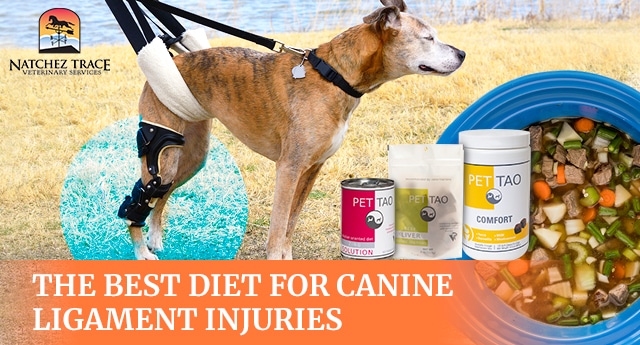What Are Canine Ligament Injuries?
If your dog starts limping or becomes lame in one of his hind legs, he may have ruptured or torn his anterior cruciate ligament (ACL), also called the cranial cruciate ligament (CCL).
The ACL is the ligament connecting the back of the femur with the front of the tibia (the bone above the knee to the bone below the knee).
The most common cause of canine ligament injuries is excessive internal rotation of the tibia when the joint is partially flexed.
Ligament injuries are often the result of trauma.
Or, they can happen when a dog is running and planting the hind limbs while the body’s momentum continues to move forward.
Unfortunately, canine ligament injuries are common in dogs.
In addition, approximately 30% to 50% of dogs who tear one ACL will tear the other ACL within a few years.
How Does Diet Affect Canine Ligament Injuries?
Medium, large, and giant breed dogs are most at risk for canine ligament injuries.
And, diet plays a significant role early on!
Good nutrition as a puppy, especially for large breed dogs, is necessary for proper bone and joint development.
In addition, larger puppies should be fed to stay lean – they shouldn’t be overfed.
Overfeeding large-breed puppies encourages a high growth rate, possibly contributing to abnormal bone development.
In addition, excess body weight puts stress on your dog’s joints – this happens to dogs of any age or breed.
Maintaining a healthy body weight and providing adequate exercise are two of the most proactive steps for your dog.
Your veterinarian can help you determine if your dog is at a healthy weight.
Eastern Medicine Diet for Dogs with Ligament Injuries
TCVM (Traditional Chinese Veterinary Medicine) studies show dogs with ligament injuries often fall into the same Eastern health classification.
According to Chinese philosophy, food is medicine, and dietary changes can significantly improve health by balancing the underlying causes of your pet’s health issues.
Dr. Smith recommends a Blood-building diet to help dogs recover from ligament injuries and promote ligament health moving forward.
In TCVM, “Blood” is much more than the liquid red substance pumped by the heart and travels through your veins.
Blood provides nourishment and moisture for your dog’s entire body.
It keeps your dog’s tendons, skin, and hair healthy, strong, and flexible.
Blood also lubricates the joints and nourishes the mind.
It keeps your dog calm and ensures sound sleep.
You can make a Blood-building diet at home or purchase the food premade.
Slow-Cooker Blood-Building Dog Food Recipe
Feed Liver
Dr. Smith also recommends feeding liver for canine ligament injuries.
In TCVM, the liver governs the tendons, ligaments, and joints.
Also, according to the Five-Element Theory of TCVM, the liver represents wood.
The attributes of wood are strength and flexibility – the same properties as bamboo!
By feeding your dog liver, those attributes are strengthened.
And, since the liver controls connective tissue, feeding liver treats helps strengthen the torn cruciate ligament.
Dr. Smith recommends PET | TAO Freeze Dried Raw Beef Liver Dog & Cat Treats. All it takes is a few treats per day to make a difference.
Ease Your Dog’s Ligament Discomfort
Another supplement Dr. Smith favors is PET | TAO Comfort to ease discomfort caused by canine ligament injuries.
Comfort is an all-natural NSAID alternative. It supplies the powerhouse substances Yucca, Boswellia, MSM, Meadowsweet, and other synergistic ingredients combined in one tasty chew.
Comfort is generally safe to use with other supplements and medications.
Comfort should be used with caution in dogs with cardiac or kidney problems. It should also be used with caution in dogs who are taking steroids.
It’s always best to check with your veterinarian before starting your dog on a new supplement.
Need More Help with Your Dog’s Ligament Injury?
We would love to help you with canine ligament injuries!
Just contact us to schedule an appointment with Dr. Smith.
You can also get a free digital copy of Dr. Smith’s book, “What Your Vet May Not Tell You About Torn Knee Ligaments, at TCVM Pet Supply.








